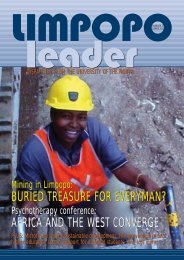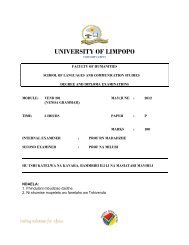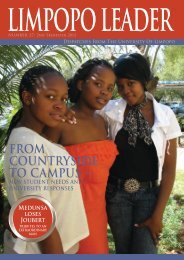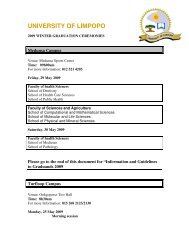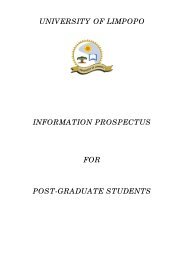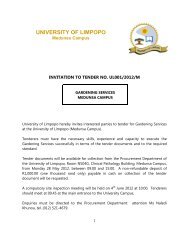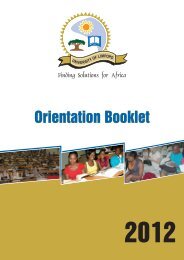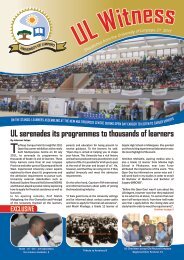Limpopo Leader - University of Limpopo
Limpopo Leader - University of Limpopo
Limpopo Leader - University of Limpopo
Create successful ePaper yourself
Turn your PDF publications into a flip-book with our unique Google optimized e-Paper software.
<strong>Limpopo</strong>’s very own medical training platformIT’S COMING AT LAST: A FULL MEDICAL SCHOOL IN POLOKWANEwith the Health Pr<strong>of</strong>essionals Council, many <strong>of</strong> whomwere working overseas, and 12 000 <strong>of</strong> whom were inprivate practice.‘Now compare this with World Health Organisationguidelines that advise a doctor/population ratio <strong>of</strong>1:500. Even at 50 percent <strong>of</strong> the WHO ratio, SouthAfrica should have 45 000 doctors. But existingmedical schools are producing only a thousand newdoctors a year. Looked at from this perspective,the whole country is on the brink <strong>of</strong> a medicalcatastrophe. We in the poorer provinces are runningour health services on foreign nationals. Here in<strong>Limpopo</strong>, the need is desperate.’Franks said his steering committee was currentlyengaged in the preparation <strong>of</strong> a business plan forsubmission to the national Department <strong>of</strong> Educationwhich will be asked to fund the Medical School facilitiesto the tune <strong>of</strong> up to R1,5-billion over three years.The project is not without its difficulties, however.Nkadimeng talks forcefully about the need for the newmedical school to foster relationships and linkageswith top international medical universities. ‘It’s difficultto attract top academic staff to Polokwane,’ he says;‘and the job <strong>of</strong> getting people from other countriesin the south is definitely made no easier by theaccreditation rules <strong>of</strong> the Health Pr<strong>of</strong>essionals Council.But unless we unlock these particular doors – thosepertaining to international linkages and accreditation– it will be much more difficult to succeed.’Nevertheless, there is genuine enthusiasm for thePolokwane medical school project, and a determinationto face the challenges that the project presents.Franks points out that Polokwane is growing rapidlyand that it will become a big regional centre over time.‘The vision <strong>of</strong> the university is to be a top-class Africanuniversity solving African problems. My personalvision is that the Polokwane medical teaching platformwill become a regional African resource.’Pr<strong>of</strong>essor Jabu Mbokazi, 4 the Deputy Dean <strong>of</strong> HealthSciences who is running the embryonic medical schoolat Polokwane Hospital, told <strong>of</strong> a recent visit by Britishacademic Dr John Cookson, who had helped tolaunch the Hull/York Medical School in north-eastEngland five years ago. ‘He was favourablyimpressed,’ Mbokazi said. ‘He admitted that theDr Morwanphaga Nkadimengembryonic Polokwane facility was currently operatingwith more specialised staff than had been at it hisdisposal when he began with the Hull/York school.’Pr<strong>of</strong>essor Philip Venter, 5 the co-ordinator <strong>of</strong> theFaculty <strong>of</strong> Health Sciences on the Turfloop campus,makes no bones about his enthusiasm. ‘We have hugepotential here – for teaching and research,’ he says.‘We’re sitting right in the middle <strong>of</strong> SADC and we’rein the process <strong>of</strong> getting a state-<strong>of</strong>-the-art medicalschool and training hospital.’Pr<strong>of</strong>essor Errol Holland, 6 the newly appointedExecutive Dean <strong>of</strong> the <strong>University</strong>’s Faculty <strong>of</strong> HealthSciences, says he firmly believes that the two medicaltraining platforms in his faculty will become worldleaders in developmental medicine. ‘In addition, we’llbecome the institution <strong>of</strong> choice for the most talentedteachers and most gifted students, particularly thosewith noble ideals to serve the most vulnerable.’We should allow Nkadimeng the last word.‘In 1956, a small hospital in Stellenbosch, against allthe odds, became a tertiary hospital. But the will tosucceed was there. Today that hospital is Tygerberg,one <strong>of</strong> South Africa’s largest tertiary teachinginstitutions. The will to succeed – in the provincialadministration and in the university – is now the mostimportant ingredient for us.’4 See the article on page 19 for more from Mbokazi. 5 See the article on page 20 for more from Venter.6 See pr<strong>of</strong>ile on page 21 for more on Holland.P A G E 1 8



